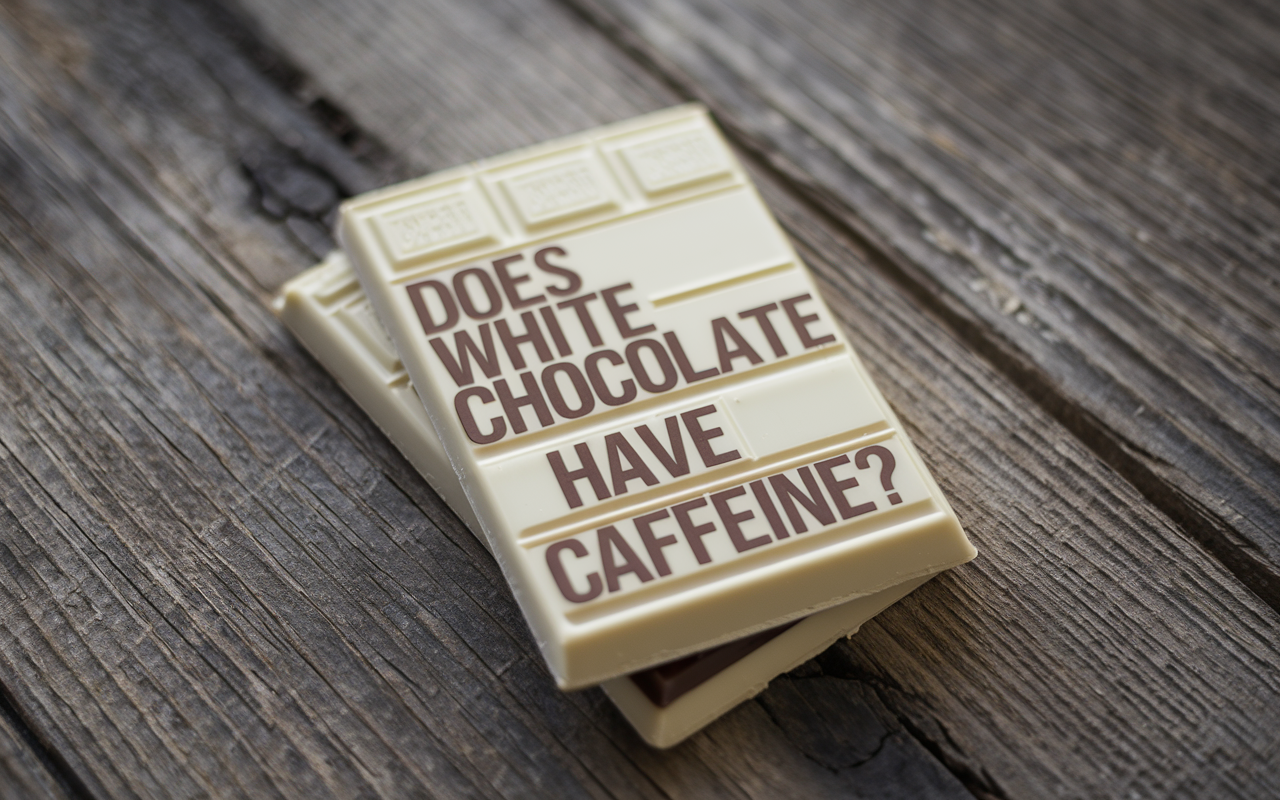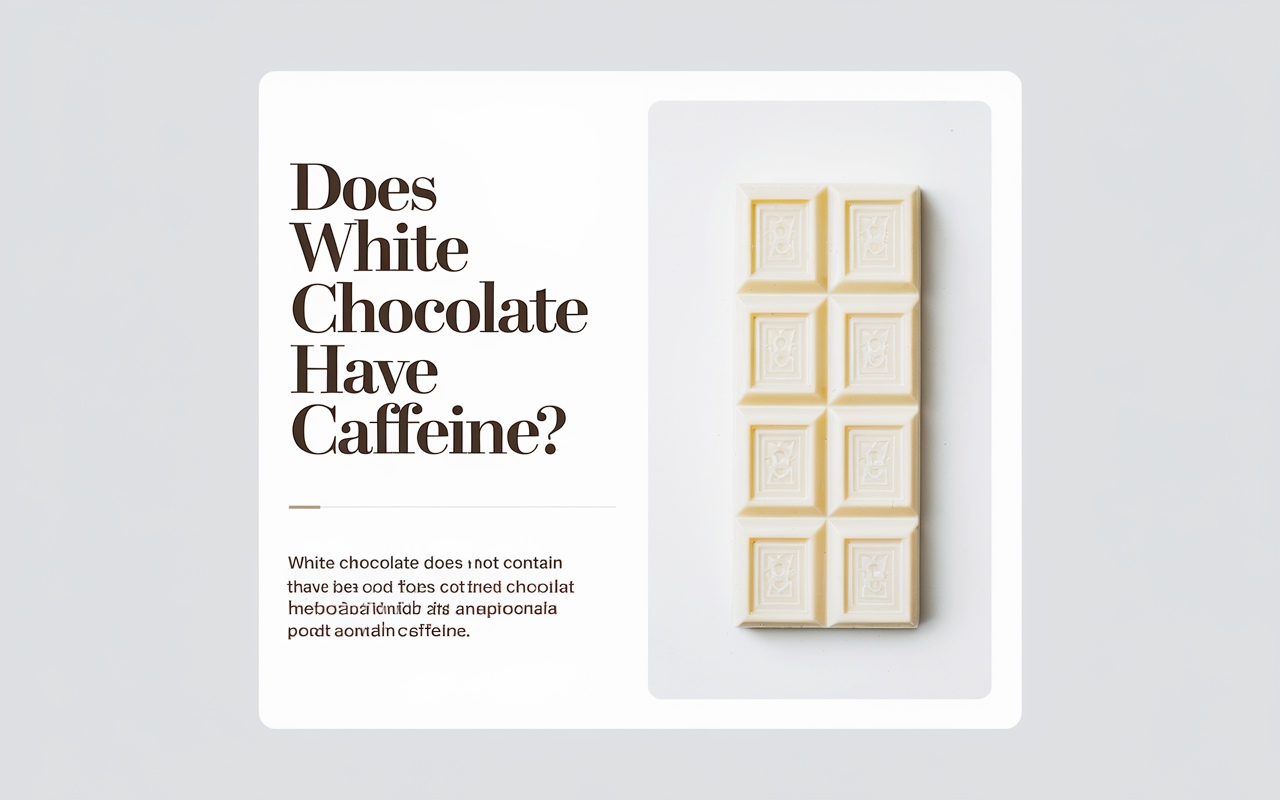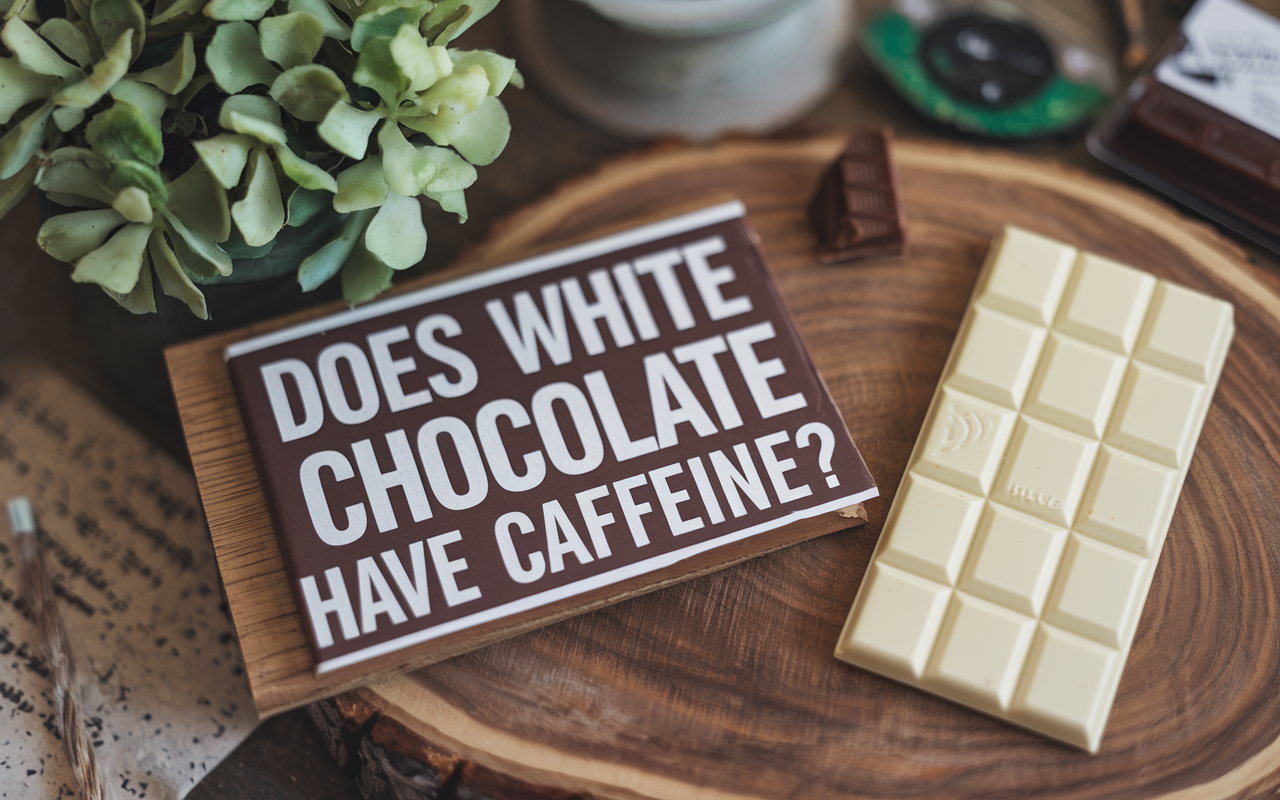Does White Chocolate Have Caffeine? Chocolate is a beloved treat across the world, enjoyed by millions for its rich, sweet, and comforting flavor. But when it comes to understanding the relationship between chocolate and caffeine, things can get a little confusing—especially with white chocolate. If you’ve wondered, “Does white chocolate have caffeine?” you’re not alone. Whether you’re a chocolate lover, someone with caffeine sensitivity, or just curious about the health aspects of chocolate, this guide is here to help.
Does White Chocolate Have Caffeine?: Understanding Caffeine in Chocolate
Caffeine is a naturally occurring compound found in cacao beans. When cacao is processed to make chocolate, the caffeine present in the beans makes its way into the final product. Dark chocolate and milk chocolate both contain varying amounts of caffeine because they are made with cocoa solids, which retain caffeine.
But where does white chocolate fit into the equation?
Let’s break it down.
What Sets White Chocolate Apart?

Unlike dark or milk chocolate, white chocolate does not contain cocoa solids. Instead, it is made from cocoa butter (the fat extracted from cacao beans), sugar, and milk. Cocoa butter does not naturally contain caffeine, meaning white chocolate differs significantly from its darker counterparts in terms of caffeine content.
Here’s a key takeaway:
- Dark and milk chocolates contain cocoa solids, and therefore caffeine.
- White chocolate, made from cocoa butter, is caffeine-free (or contains negligible amounts).
Is White Chocolate Truly Caffeine-Free?
While white chocolate is generally considered caffeine-free, there are a few caveats to keep in mind:
- Trace Amounts of Caffeine: Because it is made from cocoa butter, which may have minimal traces of other cocoa elements, white chocolate could contain extremely small amounts of caffeine—but not enough to have a stimulating effect.
- Added Ingredients: Some commercially produced white chocolate products may include flavorings, additives, or chocolate coatings that contain caffeine. Always check the label if you’re sensitive to caffeine.
For most people, white chocolate is an excellent choice if you’re looking for a chocolate treat without the caffeine.
Comparing Caffeine Levels in Chocolate

To better understand how white chocolate stacks up against its counterparts, here’s a quick comparison of the average caffeine levels found in different types of chocolate:
|
Type of Chocolate |
Caffeine Content (per 1 oz) |
|---|---|
|
Dark Chocolate (70%+) |
20-30 mg |
|
Milk Chocolate |
5-10 mg |
|
White Chocolate |
0-2 mg (negligible) |
By comparison:
- A typical 8-ounce cup of coffee contains 80-100 mg of caffeine.
- Even a strong serving of dark chocolate pales in comparison to caffeine from coffee or tea.
Does White Chocolate Have Caffeine?: Why Does Caffeine in Chocolate Matter?
For caffeine-sensitive individuals, any amount of caffeine can potentially lead to symptoms such as restlessness, jitters, or trouble sleeping. If you’re monitoring your caffeine intake closely, knowing the differences in cacao-based treats is crucial.
This is where white chocolate shines as a low-caffeine or no-caffeine option, allowing you to enjoy the creamy sweetness without worrying about the side effects of caffeine.
Benefits of Choosing White Chocolate
Beyond avoiding caffeine, white chocolate offers several other benefits:
- Dessert-Friendly: Its creamy and mild flavor pairs beautifully with fruits and desserts, making it a favorite ingredient for creative recipes.
- Safe for Caffeine-Sensitive Individuals: Whether you’re reducing caffeine for health reasons or personal comfort, white chocolate is an excellent alternative to traditional chocolate.
- No Bitter Notes: Unlike dark chocolate, white chocolate lacks bitterness, making it a hit for those who prefer sweeter flavors.
However, like any treat, white chocolate should be consumed in moderation due to its high sugar and fat content.
Tips for Caffeine-Sensitive Chocolate Lovers

If you’re looking for chocolate options that are easy on the caffeine, here are a few tips to consider:
- Stick to White Chocolate: As mentioned, white chocolate contains little to no caffeine.
- Opt for Low-Caffeine Milk Chocolate: Most milk chocolates have significantly less caffeine than dark chocolate, offering a middle ground if you enjoy some cocoa flavor.
- Check Labels: Always review ingredient lists and nutritional labels to ensure the product aligns with your dietary needs.
- Explore Alternatives: If you’re looking to avoid caffeine altogether, explore non-chocolate alternatives like carob, which mimics chocolate flavor without any caffeine.
FAQs Does White Chocolate Have Caffeine?
1. Is white chocolate safe for kids?
Yes! White chocolate is generally considered safe for children, particularly because it doesn’t contain the caffeine found in dark or milk chocolate, which can sometimes cause restlessness or hyperactivity in young kids. However, like all sweets, it should be enjoyed in moderation due to its high sugar content, which can contribute to cavities or sugar crashes if consumed in excess.
2. Does caffeine-free chocolate exist?
Strictly caffeine-free chocolate doesn’t exist if it’s made from cocoa solids, as caffeine is naturally present in cocoa. However, white chocolate is as close as it gets because it’s made from cocoa butter rather than cocoa solids, meaning it contains negligible levels of caffeine. This makes it a great alternative for people sensitive to caffeine or for those who want to avoid it entirely.
3. Can I eat white chocolate before bed?
Yes! White chocolate is one of the better chocolate options to enjoy before bed because it doesn’t contain caffeine, which can disrupt your ability to fall asleep. Unlike dark or milk chocolate, which could keep you awake, white chocolate is less likely to interfere with your sleep cycle. Just keep in mind that its sugar content may still give you a small energy boost, so it’s best to enjoy it in moderation close to bedtime.
4. Does white chocolate offer health benefits?
While white chocolate doesn’t have the antioxidants found in dark chocolate, it does have its own benefits. It’s a concentrated source of energy, thanks to its cocoa butter and sugar content, which can provide a quick boost when needed. If made with milk, white chocolate can also offer a small dose of vitamin D, which supports bone health and immune function. That said, it’s best enjoyed as an occasional treat rather than a source of essential nutrients.
Does White Chocolate Have Caffeine?: Final Thoughts
If you’re sensitive to caffeine or simply curious about the differences between types of chocolate, white chocolate is an excellent low-caffeine option. While it doesn’t deliver the health benefits often associated with dark chocolate, it offers its own appeal as a creamy, indulgent treat.
For those who value balance, understanding the caffeine content in chocolate can help you make informed, delicious choices.
Now that you know white chocolate is your go-to for guilt-free indulgence without the caffeine, why not grab a bar and savor the sweetness?
Does White Chocolate Have Caffeine
Post Disclaimer
The information contained in this post is for general information purposes only. The information is provided by Feast Forge Chef and while we endeavour to keep the information up to date and correct, we make no representations or warranties of any kind, express or implied, about the completeness, accuracy, reliability, suitability or availability with respect to the website or the information, products, services, or related graphics contained on the post for any purpose.

